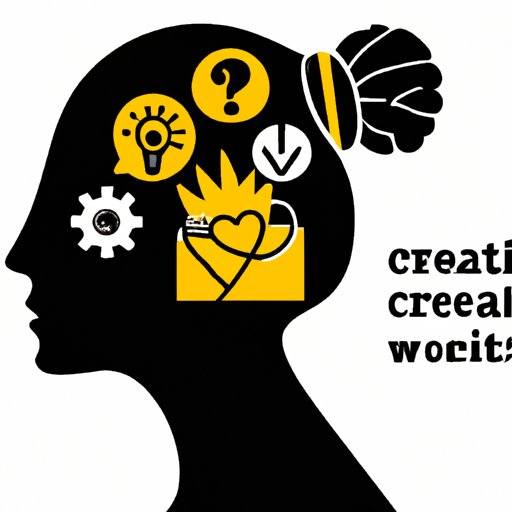Introduction
Have you ever stopped to wonder what a thought really is? Thoughts are constantly running through our minds, but we rarely take the time to explore them. In this article, we will dive into the complex world of human thinking, explore the different types of thoughts, and understand how they affect our daily lives.
This article is for anyone who wishes to understand themselves better, and to gain more control over their lives. Whether you are struggling with negative thinking or simply want to gain a deeper insight into your mind, this article is for you.
Exploring the Concept of Thought: Understanding the Mysterious Inner Workings of the Human Mind
At its core, a thought is an idea or concept that we hold in our minds. Thoughts consist of a variety of different components, including sensory input, emotions, and memories. They are formed through a complex process that involves different parts of the brain.
There are several different types of thoughts, including automatic thoughts, daydreams, and intrusive thoughts. Automatic thoughts are those that pop into our minds without us consciously thinking about them, while daydreams are more structured thoughts that we consciously create in our minds. Intrusive thoughts are thoughts that pop into our minds unwanted, often causing distress and anxiety.
The human mind is incredibly complex, and thoughts operate within it in intricate ways. Thoughts are connected to our beliefs, emotions, and perception of the world around us. They can be influenced by a variety of factors, including our upbringing, life experiences, and environmental factors.
The Power of Our Thoughts: How Our Mental Processes Shape Our Reality
Our thoughts have a significant impact on how we perceive the world around us. Thoughts can influence our decision-making, behavior, and relationships with others. They can also affect our physical and emotional well-being.
Cognitive biases are a common example of how our thoughts can distort reality. These biases are patterns of thinking that cause us to perceive things in a certain way, even if they are not true. For example, confirmation bias causes us to seek out information that confirms our existing beliefs, while ignoring information that contradicts them.
Our thoughts can also have a direct impact on our physical health. Studies have shown that positive thinking can reduce stress levels, improve immune function, and increase longevity. Negative thinking, on the other hand, can lead to depression, anxiety, and other mental health issues.
From Mind to Manifestation: How Our Thoughts Influence Our Actions and Outcomes
Our thoughts are not just limited to our minds – they also have a direct impact on our actions and outcomes. Positive thinking can lead to a more optimistic outlook on life, while negative thinking can lead to self-defeating behaviors and outcomes.
For example, if you believe that you will fail at a task, you are more likely to give up or not put in as much effort. On the other hand, if you believe that you will succeed, you are more likely to put in the effort needed to achieve your goal.
Positive thinking is not just about wishful thinking – it is about having a positive outlook on life and taking action towards achieving your goals. By focusing on the positive aspects of a situation, we can increase our motivation and confidence, which in turn can lead to better outcomes.
A Deep Dive into the Psychology of Thought: Examining the Connection Between Our Emotions, Beliefs, and Cognitive Processes
Thoughts are interconnected with our emotions and beliefs. Negative thought patterns can lead to negative emotions, which can in turn reinforce negative beliefs. This cycle can be self-perpetuating, leading to a negative outlook on life and mental health issues such as anxiety and depression.
Recognizing and challenging negative thought patterns is an important step in improving mental health. By examining our beliefs and challenging negative thoughts, we can change our emotional responses and improve our overall well-being.
Self-reflection and self-awareness are also important in developing healthy thought patterns. By taking time to reflect on our thoughts and emotions, we can gain a deeper understanding of ourselves and our life experiences.
Unlocking the Secret World of Thoughts: An Exploration of Our Unconscious Mind and Its Impact on Our Behavior
The unconscious mind plays a significant role in shaping our thoughts and behavior. Subconscious programming can lead to negative thought patterns and beliefs, even if we are not consciously aware of them.
Identifying and changing negative subconscious programming is a complex process, but it is possible with dedication and self-reflection. Practices such as hypnotherapy and meditation can be effective in accessing the unconscious mind and reprogramming negative thought patterns.
By understanding the role of the unconscious mind, we can gain a deeper insight into our thoughts and behavior, and make positive changes in our lives.
The Art of Thinking: Developing Healthy Thinking Patterns and Techniques for a More Fulfilling Life
Developing healthy thought patterns is a lifelong process that requires dedication and self-awareness. There are several techniques and practices that can help in developing healthy thinking habits.
Mindfulness and meditation are powerful tools for calming the mind and developing self-awareness. By practicing mindfulness, we can become more present and aware of our thoughts and emotions, which can in turn lead to improved mental health and wellbeing.
Other practices, such as journaling and cognitive-behavioral therapy, can help in identifying and changing negative thought patterns. By challenging negative thoughts and beliefs, we can develop a more positive outlook on life and improve our overall quality of life.
Conclusion
Understanding the concept of thought and its impact on our daily lives is an important step in improving our mental health and well-being. By recognizing negative thought patterns and developing healthy thinking habits, we can improve our relationships, career, and overall quality of life. Remember, our thoughts shape our reality – so it’s important to make them work for us, not against us.
